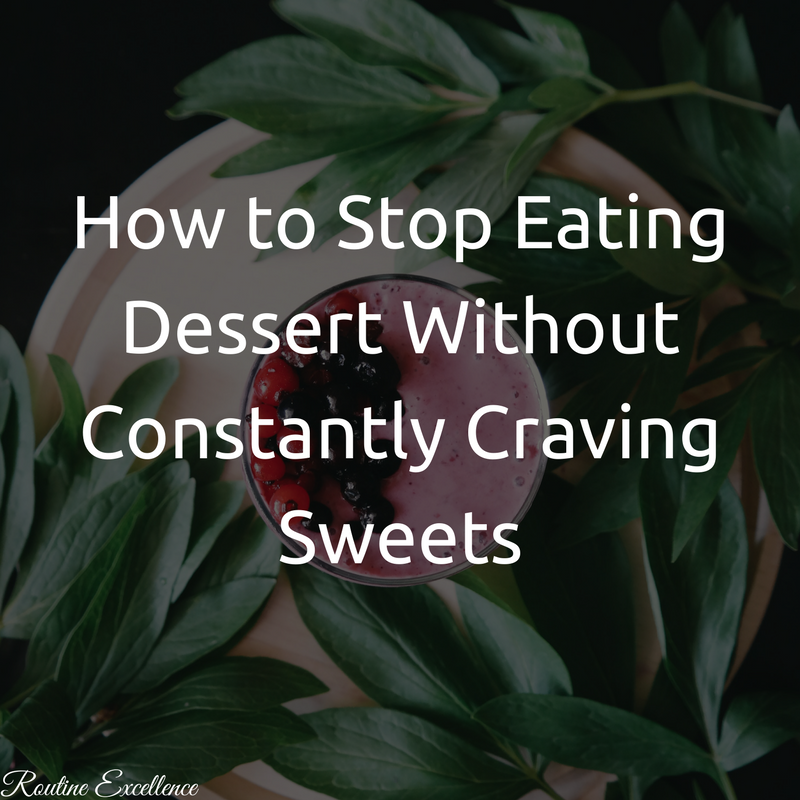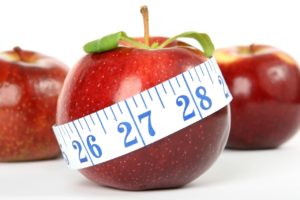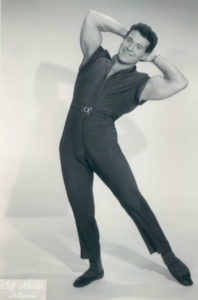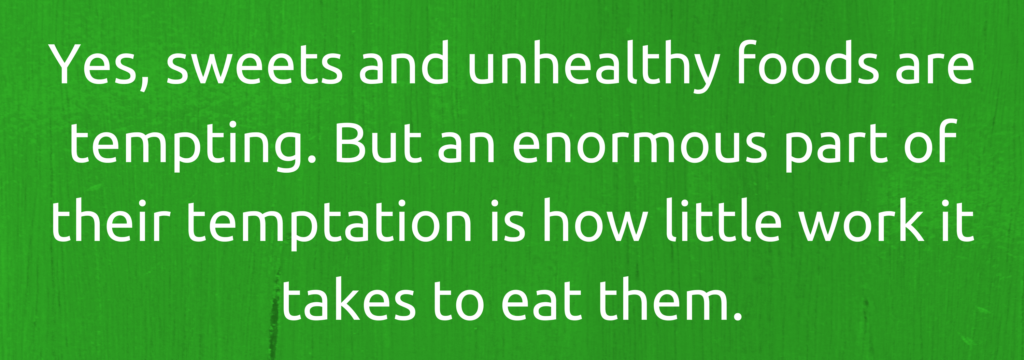
I haven’t eaten a dessert in over six years.
One day, I decided to quit—cold turkey. Over six years later, I wouldn’t be able to pinpoint the day exactly, or even tell you why I gave it up.
That decision to stop eating dessert wasn’t made overnight, and it was very nearly un-made on quite a few different occasions. Just a few short weeks after I decided to stop eating dessert, some new friends invited me over to bake brownies. The new habit was tested quickly.
Since then there have been quite a few similar decision points, moments where it would have been easy to break my rule and give in to dessert addiction.
But I never did. Outside of accidentally eating some poorly labeled granola that turned out to be laced with dark chocolate, the decision to stop eating dessert has stuck—I haven’t eaten a dessert in more than six years.
That includes birthdays and holidays, donut Fridays in the office, and road trips where every gas station protein bar seems to be flavored “double chocolate fudge.”
I want to start this off by saying that this is extreme. You don’t need to totally stop eating sweets if you don’t want to. Whether you count calories or use intuitive eating, there are other ways to adjust your diet.

But if you do want to know how to stop eating sugar cold turkey, this article will show you exactly how I did it. It includes:
- How to avoid desserts by avoiding situations where you’re always craving sugar
- The biggest challenges I faced (and that you will also face) to stop eating sugar
- How to respond when people offer you dessert
- How to respond when people hold dessert in front of your face (yes, it happens)
- How to use “rescue foods” to avoid constantly craving sweets—and giving in to dessert addiction
Table of Contents
- Deciding to Stop Eating Dessert: The Story of Jack LaLanne
- How to Stay Away From Sweets: Challenge You’ll Face in the Early Days
- How to Give up Desserts Forever (If That’s What You Want)
- Building a Healthy Eating Habit for the Long Term
Deciding to Stop Eating Dessert: The Story of Jack LaLanne
I first heard about Jack LaLanne when I was in high school, long before I learned how to work out consistently.
If you haven’t heard of him, Jack LaLanne was one of the original bodybuilders. Long before fitness was focused on strength and lifting weights was popular, LaLanne advocated it as part of an exercise routine.

To me as a high school kid, Jack LaLanne seemed like a superhuman. Even as he aged, he continued to complete impressive, record-breaking feats of fitness. Some examples include:
- Doing 1000 pushups in 23 minutes, a world record (at the age of 42)
- Swimming to length of the Golden Gate Bridge, with his hands and feet bound, towing a 1000-pound boat (age 61)
- Swimming to Alcatraz, while towing 70 rowboats behind him, to celebrate is 70th birthday
- Doing 1000 pushups and 1000 pullups in 1 hour and 22 minutes
There’s a reason he was nicknamed “The Godfather of Modern Fitness.”

All of these feats made LaLanne someone I looked up to in high school. And the accomplishments are undeniably impressive.
But as I kept reading about Jack LaLanne and made my first (short-lived) attempt to get fit by working out in the basement before school, a different accomplishment caught my eye.
LaLanne hadn’t eaten a dessert since 1929.
Is it Possible to Stop Eating Dessert—Forever?
Jack LaLanne hadn’t eaten a dessert since he was 15. He died in 2011 at the age of 96, still active and still not eating sweets.
The first time I read that, I was floored. Towing 70 boats on a mile swim for your 70th birthday is impressive, but it’s easy to imagine. I could picture the training that went into it—getting better at swimming and adding boats over time.
The thousands of pushups and pullups were imaginable too. No, I couldn’t do them myself. But it was easy to think “I bet I could do that too, if I worked out as much as he did.”

As impressed as I was by LaLanne’s strength and dedication, this was something different. I loved desserts as a kid. Some form of chocolate or candy was a near-daily event. Hell, the summer before I read this for the first time, I literally ate milkshakes for lunch.
That’s not even an exaggeration—at the time I didn’t know how to cook and rarely wanted to spend time preparing food anyway. I would take two scoops of ice cream, add milk, and mix it up until it was drinkable. That was lunch.
I had a full-blown dessert addiction. If you had asked me how to get rid of a sweet tooth, I would have responded “why would you want to?”
So the idea of never eating sweets again, for EIGHTY-ONE YEARS, was incomprehensible. I couldn’t imagine depriving myself of things that delicious. I was constantly craving sweets.
It wasn’t until much later that I understood it.
How to Stay Away From Sweets: Challenge You’ll Face in the Early Days
I didn’t give up sweets until years after reading about Jack LaLanne, but his story was what initially planted the seed in my mind.
For the most part, that seed went unwatered and ignored. It got no sunlight and didn’t grow an inch. I kept it smothered underneath chocolate, milkshakes, and homemade cookies.

But a few years down the line the idea popped up again. I was eating a lot of desserts. I knew it was probably not healthy, but that didn’t stop me from eating more of them.
And so I challenged myself. Could I stop eating desserts entirely?
The First Few Weeks after You Stop Eating Dessert
The first few weeks of not eating dessert were actually surprisingly easy for me.
I didn’t know as much about psychology, habits, or temptation at the time, but in retrospect there are a few things I did very well—and it’s because of them that I was able to continue.
1. No Desserts Were Easily Accessible
If desserts had been floating in front of my face during the first few weeks, I would absolutely have reached out and taken a bite.
But at the time it just so happened that I had no sweets in my immediate living area.
Yeah, it was because I had already eaten all of them. But still, not having those little Lindor chocolate truffles sitting two feet from my bed (they used to be my favorite) made it waaay easier to avoid eating them.

From what I’ve learned about psychology since then, this was a great strategy. People who exercise and eat healthy, or who have a lot of success in avoiding bad habits and “vices,” don’t have more willpower than anyone else.
Instead of relying on willpower, they (and I) remove willpower from the equation. I wanted chocolate, but I wanted that chocolate in my mouth right that second. I wasn’t about to go all the way to the store to pick some up.
If you’re constantly craving sweets, take a look around your living space. A lot of the time a dessert addiction is fueled by having sugar all around you. To stop always craving sweets, take sweets out of your environment.
2. I Avoided Sweets at Social Events
Not too long after I decided to give up sweets, I was invited to an “ice cream social.” Eat free ice cream and meet new people. What could go wrong?
This was an event I really wanted to go to, because at the time I didn’t know that many people, but I decided to pass. I loved ice cream too much for my own good, and an event set up around ice cream would be too much for me to handle.
Now I could walk into an event like this and not eat any ice cream, no problem. But at the time I didn’t stand a chance, so I didn’t give myself a chance.
At this point, I still didn’t know how to get rid of a sweet tooth. I was still constantly craving sweets. It was early in my decision to stop eating dessert, so going to an ice cream social would have been too tempting.

You may not always be able to avoid sweet-based social events, but staying away for the first few weeks at least will help you out.
Note, the lesson here is again about avoiding temptation. It’s about avoiding environments that encourage dessert-eating. If you get your morning coffee at Dunkin Donuts, maybe try switching to Starbucks. If there are donuts in the break room at work, try to avoid even seeing them.
3. Using Willpower to Avoid Dessert
A lot of habits advice implies that you can totally remove willpower from your decision making process. That by setting up the right environments and habits, you’ll never be tempted again.
I don’t really think that’s true.
There’s a great scene in The West Wing about alcoholism that gets at this point. White House Chief of Staff Leo McGarry was recently outed as a recovering alcoholic, and is asked “how long it took to get cured.”
He responds:
“I’m not cured. You don’t get cured. I haven’t had a drink or a pill in six and a half years, which isn’t to say I won’t have one tomorrow.”
At a later point, after being served with divorce papers, people are concerned that he’s going to relapse. He has this exchange with the president:
“Did you have a drink yesterday?”
“No, sir.”
“You going to have one today?”
“No, sir.”
“That’s all you have to say to me.”
The point is that dessert doesn’t stop being tempting, not completely.
It’s true that dessert is way less tempting than it used to be. It’s true that I haven’t eaten a dessert in over six years. And it’s true that I don’t think I’m going to start eating sweets again anytime soon.
But when I worked a few short blocks away from a chocolate factory, I’d be lying if I said my mouth didn’t water. When the wind was right, the smell of melting chocolate would fill the air, so thick it felt like you were walking slower through it.
Temptation goes down over time, and there are ways to avoid it or make it less likely. But in the early days, you’re going to get tempted a lot.
When new friends invited me over to bake brownies, I didn’t want to say no. So I went, and sat there with brownie smell in my nose, watching them drip gooey chocolate (the best brownies are gooey) into their mouths.

Want to know how to resist sweets? Or how to get over a sweet tooth? There will never be a point where you never crave sweets—but by building a habit you can make it so that you aren’t constantly craving sweets.
In the early days, it’s going to take some effort to say no. There are a couple of psychological tricks you can use to help yourself out in situations like this.
- Know when you’re going to encounter sweets. Turning down desserts can be extremely difficult to do in the moment. If you know there will be sweets, it becomes easier to pre-plan. Specifically reminding yourself not to have desserts at the beginning of a night makes it more likely that you’ll last to the end of a night.
- Plan out if/then situations for when you’re off-guard. This tip comes from psychologist Robert Cialdini, and is relatively simple to implement. Say to yourself (or better, write down) “if the waiter offers dessert options…then I will decline.” Anticipating situations puts you in a stronger position to decline, as above.
I didn’t know it, but I used both of these strategies at the time. Watching people eat brownies was hard, but imagine if I had showed up not knowing there would be brownies. There’s no question—I certainly would have caved.

There will be times when you need to use willpower. In the early days, avoiding temptation and having tools to deal with it can keep you going.
Now, even though chocolate smells delicious, I have enough experience saying no that it doesn’t really bother me.
How to Give up Desserts Forever (If That’s What You Want)
If you stop eating dessert for a few weeks, you’re going to start encountering new challenges.
The first challenge is relatively easy to avoid—if you know about it in advance.
After a few weeks of avoiding events with sweets and not buying any sweets for your own home, it’s common to think that you are “immune.” You aren’t.
This mistake shows up in exercise, diet, productivity, and any kind of new habit. Once you’ve been successful for a while, it’s really easy to think that you can stop doing the things that make you successful.
In the context of desserts, that means exposing yourself to sweets all at once. It means going from relatively little stimulus and not needing to say no all that often, to a lot of stimulus, and more opportunities to cave and say yes.
Especially because you haven’t had dessert in a while, you’re going to start seeing desserts all over the place. Biscuits or cookies, cakes, chocolates and candies, custards and puddings, frozen desserts, pies, and pastries will all seem like they’re everywhere.
Even dessert wines or sweet soups could seem tempting. If you’re in the Midwest like I was, you might see deep-fried desserts. Actually, seeing deep-fried Oreos was a bit helpful for me, because they kinda grossed me out.
The point is : if you stop eating sugar, you need to re-expose yourself to sugar gradually.
Again, overcoming this challenge is simple (even if it isn’t necessarily easy). Keep doing what you’re doing. Introduce new temptations in stages.

But at this point and beyond you’re also likely to be encountering other challenges, things that didn’t necessarily exist when you were first learning how to stop eating dessert.
One of the challenges I wasn’t expecting is that people started to actually wave desserts in my face. I never thought that people would intentionally moan while eating a cupcake to try and tempt me.
I was shocked when people confronted me—sometimes aggressively—about my decision to stop eating dessert.
The other major challenge was that environments change unexpectedly. I had cultivated an environment that helped me avoid temptation, but I wasn’t entirely prepared for what changes to that environment would do to my new habit of avoiding sugar.
We’ll cover both of these challenges in detail.
How to Respond When People Offer Your Dessert (and What They’ll Say)
It’s a little odd to find yourself in the middle of a quest to not do something, but there I was. A few weeks into my quest to never eat dessert again, people started finding out.
When you decide to stop eating dessert, you’ll quickly start encountering situations where people offer you dessert and you have to decline. It’s hard to know what to say.

These offers can come in a variety of different types, and some are more difficult to refuse than others.
- A person might comment on the presence and quality of the desserts that are around (for example, “I hear this place is known for its red velvet cupcakes.”)
- Someone might offer you a dessert that they brought or made themselves
- People may organize a social event that’s centered around a dessert (for example, “let’s all go out for ice cream.”)
There are a ton of different ways this can happen. In college, it was common for people to organize an ice cream trip to “Dari Barn,” a local spot only open from spring to fall.
In professional life, I’ve seen people bring in homemade cookies or brownies. Donuts are a regular occurrence in many offices.

Just recently, I went out to a dinner for my birthday. Instead of bringing out the check, the restaurant brought out a complimentary slice of flan, with chocolate sauce and whipped cream. Of course they had no way of knowing I wouldn’t eat it—they were just trying to do a nice thing.
What can you say to people in these situations?
What Not to Say When Declining Dessert
Over the past six years, I’ve had a lot of opportunities to test out different ways of declining desserts.
Through that testing, I’ve found that saying some things comes across as graciously declining, while others are taken almost as a personal challenge. Early on, most of what I said was in the second category.
That was a mistake.
Picture me, sitting across from some new friends at lunch. It’s a group of around five people, and several of them have gotten cake. I can actually remember the exact cake—peanut butter Oreo cookies and cream.
I, of course, have no cake. People at the table are making delighted noises as they eat it. Even those who have not gotten cake are offered a bite to try. Which everyone does, until the offer gets to me.
“No thanks.” It’s a straightforward decline, and I give a little half-smile at the same time, as if to say “it’s nothing personal.” But it isn’t enough, and they’ll offer again.
“I actually don’t really eat dessert.”

That’s how I declined desserts for the first few months. And there are advantages to this approach! Right off the bat, people know where I stand. Theoretically, that means they should know not to offer me dessert in the future right?
Well, no. In my experience it didn’t work like that.
Saying no to dessert is a bit tricky for a few reasons:
- You want to stay polite. Someone is being nice by offering you something, and you want to honor that.
- You don’t want to sound snotty. It wasn’t intentional, but I know “I don’t eat dessert” can come across as a bit pretentious to some people.
- You don’t want to extend the conversation. It’s hard to stop eating sugar if people are constantly talking about dessert. Decline quickly, without making it a whole big thing.
- People will try to tempt you. I never thought it would happen, but if you say the wrong thing people will absolutely keep pushing dessert on you even after you decline.
Here are the most common responses I encountered in response to saying I don’t eat dessert, and how I responded to them.
After we go through each, I’ll talk about how I could have declined better, and how I decline now.
“Really? Why?”

The most common immediate response is interest, which makes sense. Not eating dessert is a bit unusual, so it makes some sense that people are surprised by it.
On the whole, this is a pretty natural response that shouldn’t cause you too many problems on its own. It’s the responses that come after this one that make it harder to avoid temptation.
“Not even on your birthday?”

Nope, not even on my birthday. As I already mentioned, this caused a tricky moment on my most recent birthday, where I had to give my dad a free slice of flan (which, to be fair, he wasn’t upset about).
One year I got a “cake” made entirely of watermelon and pineapple, which was delicious. But I still don’t eat traditional birthday cake.
This is a really common statement, and I’ve found the best response is just to hold my ground. I’ll repeat back “not even on my birthday” with a kind of finality to it.
Sometimes people will ask more questions, or about other specific scenarios. “What if your grandma spent hours slaving in the kitchen to make you your favorite cake for your birthday?” It’s kind of amazing how many bizarrely specific situations people can come up with.
In each case, I double down on my response.
“I really don’t eat that much dessert, and I went to the gym earlier.”

When you say you don’t eat dessert, people will often try to defend their own eating habits. So many times, me declining a dessert turns into someone telling me about their exercise routine.
I can’t be entirely sure why this happens—maybe people want to justify their eating of dessert, or maybe they want to make sure I’m not judging them.
Regardless of the reason, my response is to make it clear that not eating dessert is my personal decision. It’s none of my business what another person is eating, and I spent enough time worrying about what I eat without judging what other people eat.
If this happens to you, respond gently. I’ll comment that it’s a personal decision and, if they are currently eating something sweet, might even say “and it looks good, too.”
This seems to work pretty well.
“Are you suuuuuuure you don’t want some?” and “Come on, just one bite!”

Two common, yet surprising responses. Both are trying to get you to eat dessert.
This kind of response is actually the biggest reason I no longer decline dessert by saying “I actually don’t eat dessert.” I was shocked when it started, but that response was too often met by people taking a large bite of cake and making exaggerated “mmmmmmmmmm” noises.
It’s kind of unfortunate how often saying I don’t eat dessert is met by teasing, and people waving dessert under my nose. Early on, this was one of the hardest things to say no to.
Personally, I’ve found that the best response is to laugh it off. If you give too strong of a response to the taunts, it encourages people to keep waving dessert in front of your face. If you laugh and say “No thanks, but you enjoy it,” people will eventually lose interest.
Nowadays my friends know not to bother offering. And because I’m better at declining desserts, it doesn’t come up as often with strangers or acquaintances.
But for some strange reason there’s still one situation where people insist I try dessert: fortune cookies.
Reading fortune cookies after a meal at a Chinese restaurant is such an ingrained tradition that even pretty close friends still try to get me to join them. I still decline, but I’ve always thought it’s interesting that this one situation is the exception.
So How Should You Turn Down Dessert?
Outright sharing that you don’t eat dessert can lead to conversations that make it more difficult to stay the course. A key part of breaking the dessert habit is avoiding temptation, and turning the fact that you don’t eat dessert into a topic of conversation can make that difficult.
Your First Response Declining Dessert

“Oh! No thanks, but I appreciate you offering.”
That’s what I’ll say the first time someone offers me dessert. Let’s over-analyze the hell out of why I say it like this.
First of all, this is a clear “no.” You don’t want to beat around the bush—it’s important to decline outright.
Second, I start with “Oh!” This keeps the response casual. It’s still a clear no, but saying “oh” and smiling a bit makes it clear that this is nothing personal.
Third, you’ll notice I thank them for offering. Some people get miffed when you decline, especially if they’ve gone out of their way to do something nice. This helps prevent that.
Note: Saying you appreciate the offer can imply that they should follow up another time with a different offer. The second time someone offers I’ll change “I appreciate you offering” to “No thanks, I’m okay.” Decline enough times and they’ll stop asking, or you move on to your next response.
Your Second Response Declining Dessert

If someone insists I try a dessert after I decline, I’ll follow up my initial statement with “I’m actually not the biggest fan of sweets.” Again, this is a clear no.
To be honest, this bends the truth a little bit. I liked sweets a little too much—my dessert addiction is part of why I stopped eating them. I’m not a “fan” now, in the sense that I stopped because I was overindulging.
But phrasing the second response this way is very effective, which is why I do it. It’s a clear no, but it’s a no that dismisses the entire category of sweets. Again, someone is being nice by offering me something. By saying no like this, I can make the rejection less personal.
I also like this follow-up because it makes my refusal seem more like a taste preference and less like a decision. When I responded with “I actually don’t really eat dessert,” I became known as “the one that doesn’t eat dessert.”
Literally. On more than one occasion, the subject came up in front of friends-of-friends who said “oh you’re that guy”—they had heard of my “weird” eating habits before meeting me.
Making it about taste makes it less likely that people keep pushing. But if they do, there’s a final response you can give.
Your Third and Final Response Declining Dessert

Occasionally, someone will keep pushing. “Oh, you’re not a fan of sweets? Well that’s because you haven’t tried my pie yet.”
It doesn’t happen often, but it does happen. Now is when I’ll finally respond “I actually don’t really eat desserts.”
It follows two other rejections, so this response is less surprising. You’ve also declined graciously twice, which lessens the potential to be seen as pompous.
At this point, the conversation will end or enter a loop when they offer again. The phrase “just one bite” will come up, and you’ll just have to keep declining.
Note: At some point people you spend a lot of time around will find out that you don’t eat desserts, even if they haven’t been insistent. In my experience, it doesn’t become a big conversation unless you let that bomb drop in your first few conversations.
Miscellaneous Stuff People Will Say When They Find Out You Stopped Eating Dessert
There are a few other miscellaneous comments people will make once they find out you don’t eat dessert.
As I’ve already mentioned, the exception to every rule seems to be fortune cookies. No matter how many times I decline a fortune cookie, someone will keep telling me I have to see my fortune. I usually deal with this by taking the fortune and giving someone else a cookie.
Another common response is to ask for a definition of dessert. This is kind of tricky, because I don’t actually have one. In deciding what is or isn’t dessert, I follow Supreme Court Justice Potter Stewart’s rule for pornography: “I know it when I see it.”

After asking for a definition and not getting one, people will often ask you to judge specific examples. Is a muffin dessert? What about pancakes? Fortune cookies also come up during this conversation.
Finally, everyone will make the same joke: “if you eat the ice cream before your sandwich, then the sandwich is dessert!” You can choose to argue the point or not; everyone makes this joke and thinks it’s hilarious no matter what you say.
The Hardest Parts about Giving up Dessert
I should have expected it to be difficult to stop eating dessert. Hell, the younger me knew how hard it sounded when he was reading about Jack LaLanne for the first time. So it shouldn’t have been surprising.
And in some respects, it wasn’t. I did my best to avoid constantly craving sugar, but I was definitely still tempted at first. When I was around desserts, it took some willpower to say now.
What’s surprising is when these urges came up. Six years in I’m doing pretty well, and I’m not always craving sugar anymore. But even two or three years in, there were some specific circumstances that almost made me give it all up.
I’ve already covered one of the hardest situations about not eating sweets—the social interactions surrounding dessert.
But there are quite a few other moments that will come up. Here are the ones I dealt with, and how you can deal with them too.
Living with People Who Eat Sweets after You Stop Eating Dessert
About a year into my no-dessert experiment, I stayed with my parents for a month. They don’t eat dessert with every meal and they don’t go nuts over sweets, but there were still chocolates and ice cream in the house.
Up to this point, it had been relatively easy for me to stop eating dessert. In my living situation, I never had desserts anywhere close to me. If I wanted sweets and had a craving for sugar, I would need to go to the grocery store, a restaurant, or a social event. With some distance between me and the dessert, it was easier to say no.
Even when my roommate had sweets, it was still relatively easy to avoid. After all, I wasn’t about to start stealing his snacks.
But living with my parents, I got to see people eat chocolate (which I love) and homemade baked goods on a semi-regular basis. And if I wanted some, all I needed to do was open the cabinet and break me off a piece.

A year after I decided to stop eating dessert, I thought I had conquered the urge to eat dessert. Oh no. Faced with easy chocolate, it took a lot to avoid gobbling it up. Sugar cravings that I thought were gone resurfaced, and it was hard to avoid binge eating sweets.
I wound up moving all of the sweets to the back of the pantry, to make them harder to get to. I spent as little time as possible in the kitchen. I ate my “rescue foods” (more on that in a moment). And by the end of my time there I had made it through.
Moving Apartments: Not Having Food in the House
A few years ago, I moved to Chicago. Again, I was suddenly faced with unexpected situations that made it more difficult to avoid desserts.
Moving is stressful. I haven’t studied the research in-depth, and I imagine it varies substantially, but there’s at least some suggestion that moving is among the most stressful life experiences (above even divorce).
When I moved to a city, a lot of the systems I had built crumbled away. I needed to build new routines from scratch. And although systems and habits are extremely powerful ways to change your behavior, they also can take a long time to start working.
That, coupled with the fact that I was two blocks from the best pie in the city (allegedly), put me in a difficult situation.

I’ve moved again within in the city since then, and the key to maintaining your good habits is to reintroduce structure as quickly as possible—and to plan ahead.
When I moved the second time, I had a plan in place to pick up groceries. I even picked out the restaurant I’d go to that first night for dinner, a Korean place around the corner.
When your systems are stripped away, being presented with dessert makes it harder to say no. The more you can plan your systems out before a move, the better positioned you’ll be.
Working in an Office: Avoiding Donut Friday
Working in an office has been the last major change since I decided to stop eating dessert. The reason? Free donuts.
When you walk past a tray of fresh, “artisanal” donuts every week, you start to get sugar cravings. And when you’ve never been placed in that situation before, or when you’re super hungry because you don’t like eating breakfast (me), they tempt you more.
via GIPHY
Eventually I got used to free donuts and other treats sitting in the kitchen. In the interim, I had to take a few other steps:
- For a while, I started eating breakfast so I wouldn’t be hungry when I saw donuts
- I took the long way around to my desk, to avoid seeing the donuts
- If I needed something from the kitchen, I waited until later in the day when they were all gone
Over time, you can get used to seeing desserts regularly. It’s when you’re faced with change that a habit of not eating dessert becomes most fragile.
Which brings me to the most important lesson of this section.
Change in Your Environment is the Biggest Challenge When You Stop Eating Dessert
These three situations are what I encountered when I decided to stop eating dessert.
But the specific situations themselves are less important that the overall principle they reveal: change makes habits difficult.
When your environment changes, you’re exposed to new habit cues—and many of your old ones disappear.
Building up those new habits takes time. As I’ve already covered, planning out your new habits and anticipating challenges can make the transition easier. The exercises in my guide on going to the gym consistently can help, as can insights from the psychology of habits.

I also like “rescue foods,” a technique I borrowed from fitness writer James Fell.
Rescue Foods: What to Eat When Craving Sweets
When I walk in the door after work, or the gym, or…basically anything else, my stomach growls.
I’m almost always hungry by the time I get home. This is a common situation, and it often leads to eating less healthily than you might otherwise want to.
Picture it—you’ve got chocolate or a bag of chips just sitting there waiting to be eaten. When you’re hungry, the thought of cooking or assembling a snack can be exhausting. It’s easier to eat the chips than it is to cook up a nice grilled chicken salad.
How can you avoid eating dessert? More importantly, how can you reliably avoid temptation over the long term, without getting tired of the foods you eat?
Rescue foods.
Rescue foods are foods that you prep in advance for just these occasions. You walk in and need to eat something now. If you only have Oreos in the pantry, you’ll eat them.
But what if you’ve got some baby carrots in the fridge? Or some sliced peppers? Or even whole wheat crackers with some cheese?
Want to know how to stop eating junk food? This is one of the best methods I’ve found, especially because it helps satisfy your need to snack.
Yes, sweets and unhealthy foods are tempting. But an enormous part of their temptation is how little work it takes to eat them.

By taking the prep out of the equation, you can help yourself stay much more consistent.
There are a lot of different possible rescue food you could eat. I’ve found the above examples to be good options. But if you’re craving sweets, baby carrots might not cut it. What are some good rescue foods to keep around? What should you eat?
- Greek yogurt. Very lightly sweetened greek yogurt can be a great move
- Fruit. A variety of fruits are helpful to eat when craving sweets. I like apples, oranges, clementines, grapes, peaches, and pineapple the most (tip: get a pineapple corer to slice a pineapple in like 30 second)
- Raisins. Especially if you eat oatmeal, adding raisins adds a nice sweetness.
- Frozen grapes. Yeah, this is the third time grapes are on this list in some form, but seriously, toss some grapes in the freezer and thank me later.
- Nuts. Almonds, peanuts, cashews, walnuts etc. are high in protein and have a decent amount of fat to them. Sometimes it’s hard to tell the difference between a sweet craving from a fat craving—nuts can help, and are easy to keep around.
- Smoothies. Some fruit, protein powder, and yogurt in a smoothie can go a long way to stop sugar cravings.
- Drinks. Fruit juice or lightly sweetened tea can be helpful. Long-term water is healthier, but juice can help the transition right when you stop eating dessert. I also like coconut milk and coconut water for this.
- Veggies. Sliced peppers, carrots, celery, lettuce and other veggies might not stop sugar cravings, but they give you something to munch on.

Building a Healthy Eating Habit for the Long Term
Remember: if you want to stop eating dessert, it will take time.
If you choose to give up sweets completely, it will definitely be hard at first. Hopefully I’ve given you some stuff to think about, so you’re better prepared to face social situations and avoid temptation.
If you’re just looking to cut down on desserts, these methods of avoiding temptation are going to make it much, much easier. It’s amazing how keeping sweets away from your environment makes it less tempting to eat them.
You’ll encounter different challenges at each stage of your healthy eating habit. By altering your environment and preparing for temptation, you can increase your chances of success.
Leave a Reply
You must be logged in to post a comment.